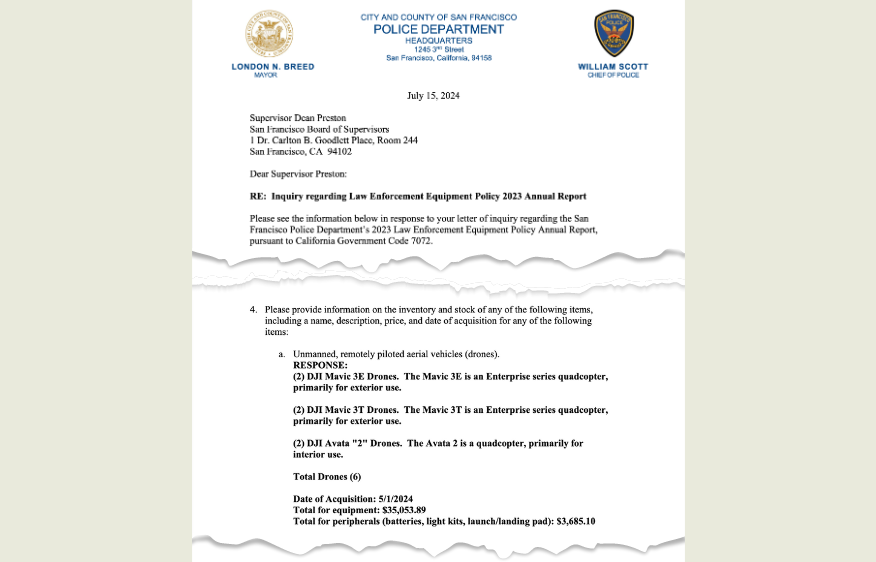California state law AB 481 requires law enforcement agencies to go through a public approval process prior to acquiring items classified as "military equipment," which include assault rifles, tear gas, drones, and more. The process includes proposing a use policy for the equipment, as well as fiscal impact.
Yet in May of this year, the San Francisco Police Department bypassed the state law's requirements, and acquired six drones, according to the Department's response to questions from San Francisco Supervisor Dean Preston.

Excerpt from SFPD's June 15 2024 letter to Supervisor Preston
When the San Francisco Board of Supervisors approved SFPD's military equipment use policy in December 2022, SFPD's inventory and policy did not include drones. However, in SFPD's July 15 2024 response to questions raised by San Francisco Supervisor Dean Preston, SFPD admitted acquiring six drones on May 1. SFPD had not gone through any of the policy approval and adoption process required by state law before acquiring the six drones.
AB 481 requires elected officials to consider whether there may be more cost-effective alternatives to meet the same public safety objectives, as well as whether the proposed use policy would safeguard the public's welfare, safety, civil rights, and civil liberties. This consideration prior to acquisition gives communities the opportunity to publicly comment on the impacts of police militarization, how that impact may be felt across neighbors of different race or socioeconomic status, and whether the proposed military equipment may be the most cost-effective (or even effective) means to achieve public safety.
State law AB 481 enables California communities to challenge and limit police militarization. For example, communities may question whether the local law enforcement agency's policy permits deploying tear gas at children, how the LRAD policy may prevent permanent hearing loss given past police LRAD use led to people losing their hearing permanently, or if the local law enforcement agency's policy authorizes deploying flashbangs into someone's home given past police flashbang use has led to 3rd degree burns, disfigurement, and death.
AB 481 requires law enforcement agencies to follow an approval process before requesting, acquiring, seeking funds for acquisition, borrowing or leasing, or using military equipment that had not been previously approved. This obliges agencies to post the proposed policy for 30 days on its website [Gov. Code Sec. 7071(b)] and to seek approval of the proposed policy from the governing body [Gov. Code Sec. 7071(a)].
SFPD has had a series of issues around complying with state laws regarding its military equipment. SFPD's initial AB 481 military equipment use policy approval process began weeks after AB 481's required final start date of May 1 2022. Their first annual use report was required to be released on their website by January 2024 but wasn't posted until half a year later on June 11 2024. And back in January 2022, AFSC filed a lawsuit against the San Francisco Police Department for unlawfully denying a California Public Records Act request for information on the purchase and deployment of militarized equipment.
While San Francisco's recently approved Proposition E permits SFPD to acquire surveillance technology without publishing a use policy, it does not apply to drones. In any case, AB 481 is a state law and takes precedence over local law on the matter of drones.
Supervisor Preston's questions have brought SFPD's illegal drones acquisition to light, but many questions remain. How will SFPD protect Fourth Amendment protections against arbitrary searches when using their drones? Has SFPD already been using these drones? What drone footage has SFPD already stored, or shared with other parties?
When law enforcement agencies comply with state law AB 481, communities may better understand the impact of police militarization, and may place limits on the harms caused by police militarization.
AFSC encourages San Francisco residents to speak up against this illegal expansion of police surveillance, and call their Supervisor and ask for the drones to be returned and for SFPD to adopt internal measures to avoid breaking California state law in the future.